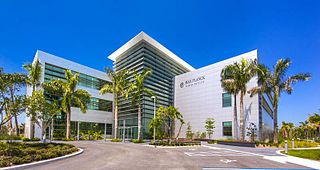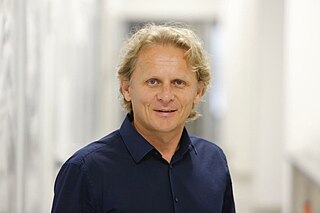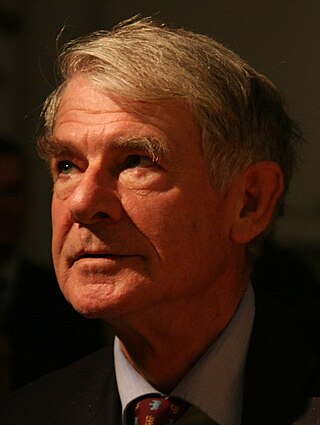
Goethe University Frankfurt is a public research university located in Frankfurt am Main, Germany. It was founded in 1914 as a citizens' university, which means it was founded and funded by the wealthy and active liberal citizenry of Frankfurt. The original name in German was Universität Frankfurt am Main. In 1932, the university's name was extended in honour of one of the most famous native sons of Frankfurt, the poet, philosopher and writer/dramatist Johann Wolfgang von Goethe. The university currently has around 45,000 students, distributed across four major campuses within the city.

The Gottfried Wilhelm Leibniz Prize, or Leibniz Prize, is awarded by the German Research Foundation to "exceptional scientists and academics for their outstanding achievements in the field of research". Since 1986, up to ten prizes have been awarded annually to individuals or research groups working at a research institution in Germany or at a German research institution abroad. It is considered the most important research award in Germany.

The Frankfurt Institute for Advanced Studies (FIAS) is a private-public institution for basic theoretical research in various areas of science focusing on interdisciplinary research. It is located in Frankfurt am Main, Germany, at its own home at the Frankfurt-Riedberg campus of the Goethe University. It was founded in 2003.

The Max Planck Institute of Biophysics is located in Frankfurt, Germany. It was founded as the Kaiser Wilhelm Institute of Biophysics in 1937, and moved into a new building in 2003. It is an institute of the Max Planck Society.

The Max Planck Institute for Brain Research is located in Frankfurt, Germany. It was founded as Kaiser Wilhelm Institute for Brain Research in Berlin 1914, moved to Frankfurt-Niederrad in 1962 and more recently in a new building in Frankfurt-Riedberg. It is one of 83 institutes in the Max Planck Society.

Klaus Rajewsky is a German immunologist, renowned for his work on B cells.
Franz-Ulrich Hartl is a German biochemist and the current Executive Director of the Max Planck Institute of Biochemistry. He is known for his pioneering work in chaperone-mediated protein folding.
Wolfgang Gentner was a German experimental nuclear physicist.

Hubert Simon Markl was a German biologist who also served as president of the Max Planck Society from 1996 to 2002.

The Max Planck Florida Institute for Neuroscience (MPFI), is a research facility located in Jupiter, Florida. Its research focuses on brain function and neural circuits, using techniques to visualize microscopic molecular processes. It is the first institute established by the Max Planck Society in North America.

Ivan Đikić is a Croatian-German molecular biologist who is the Director of the Institute of Biochemistry II at Goethe University Frankfurt.
The Ernst Strüngmann Institute for Neuroscience in Cooperation with Max Planck Society (ESI) is an independent research institute financed by Andreas' and Thomas Strüngmann, German entrepreneurs, and named after their father Dr. Ernst Strüngmann. The ESI is under the scientific governance of the Max Planck Society. It is located in Frankfurt am Main in Hesse. ESI-directors are Scientific Members of the Max Planck Society. ESI’s mission is to perform excellent fundamental brain research. ESI research focuses on understanding how the many parts of the brain work together to bring about our behaviour.

Martin Stratmann is a German electrochemist and materials scientist. He is one of the directors at the Max-Planck-Institut für Eisenforschung in Düsseldorf since 2000, and heads its department of Interface Chemistry and Surface Engineering.

Peter Hegemann is a Hertie Senior Research Chair for Neurosciences and a Professor of Experimental Biophysics at the Department of Biology, Faculty of Life Sciences, Humboldt University of Berlin, Germany. He is known for his discovery of channelrhodopsin, a type of ion channels regulated by light, thereby serving as a light sensor. This created the field of optogenetics, a technique that controls the activities of specific neurons by applying light. He has received numerous accolades, including the Rumford Prize, the Shaw Prize in Life Science and Medicine, and the Albert Lasker Award for Basic Medical Research.

Birgitta Wolff is a German economist and politician of the Christian Democratic Union (CDU). She served as minister of education and culture and as minister of research and economy in the state government of Saxony-Anhalt from 2010 to 2013, and as president of the Goethe University Frankfurt from 2015 to 2020.

Wolf Joachim Singer is a German neurophysiologist.
Erin Margaret Schuman, born May 15, 1963, in California, US, is a neurobiologist who studies neuronal synapses. She is currently a Director at the Max Planck Institute for Brain Research.
Ernst Bamberg is a German biophysicist and director emeritus of the Department of Biophysical Chemistry at the Max Planck Institute of Biophysics.
Tatjana Tchumatchenko is a physicist in the field of theoretical neuroscience. She is an independent Max Planck Group Leader and, since November 2020, professor for Computational Neuroscience of Behavior at the Faculty of Medicine of the Rheinische Friedrich-Wilhelms-Universität Bonn (Germany). In her research she investigates how neural networks compute and how particular activity patterns emerge from synaptic and neuronal features.
Hans-Wolfgang Spiess, also Hans Wolfgang Spiess, is a German polymer chemist who specializes in the Nuclear magnetic resonance spectroscopy of macromolecules. He was director of the Max Planck Institute for Polymer Research in Mainz until his retirement in 2012.












